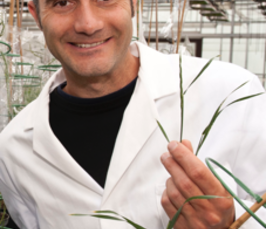Sustainable control of disease resistance – the case for GM wheat Sustainable control of disease resistance – the case for GM wheat
Institutskolloquium
- Datum: 04.12.2020
- Uhrzeit: 10:30 - 12:00
- Vortragender: Dr. Brande Wulff
- Brande is a molecular plant pathologist and geneticist. He uses high throughput DNA sequencing and bioinformatics to identify genes restricting major diseases of wheat. His long-term aim is to use cloned genes from wild ancestors of wheat to engineer durable resistance to these diseases in cultivated wheat. Brande works in the John Innes Centre, UK, a centre for research and training in plant and microbial sciences.
- Ort: Zoom Meeting Room 1
- Gastgeber: Dmitry Moseev
- Kontakt: dmitry.moseev@ipp.mpg.de

Worldwide, crop yields are reduced by 20 to 30% every year due to pest and disease. Protecting crops with pesticides is expensive, environmentally unfriendly and unsustainable. The wild relatives of crops represent a treasure trove of genetic resistance, however, introducing this resistance into our elite crops through traditional breeding is like crossing a racehorse with a donkey; it takes many years to combine the best of both worlds. However, if we could clone disease resistance genes from the wild relatives, then these could be delivered as transgenes into their domesticated brethren. A stack of multiple resistance genes holds great promise for long-lasting, i.e. durable disease resistance.
Faced with this task, we have developed fast, new and efficient methods for gene discovery and cloning which use mutant and natural populations followed by sequence alignment to locate genes [1-4]. We also developed a method for halving the generation time of wheat and other crops, in a controlled environment, dramatically speeding up capabilities for research and breeding purposes [5].
Our focus is on wheat and its major diseases. Our long-term aim is to engineer pyramids of resistance genes against major diseases of wheat [6-7]. I will present our enabling technologies and a roadmap for sustainable, disease resistant GM wheat.
1. Steuernagel et al (2016). Rapid cloning of disease-resistance genes in plants using mutagenesis and sequence capture. Nature Biotechnology 34:652-5.
2. Sánchez-Martín et al (2016). Rapid gene isolation in barley and wheat by mutant chromosome sequencing. Genome Biology 17(1):221.
3. Arora et al (2019) Resistance gene cloning from a wild crop relative by sequence capture and association genetics. Nature Biotechnology 37:139-143.
4. Steuernagel et al (2020) NLR-Annotator enables annotation of the intracellular immune receptor repertoire. Plant Physiology, DOI: https://doi.org/10.1104/pp.19.01273
5. Watson et al (2018). Speed breeding is a powerful tool to accelerate crop research and breeding. Nature Plants 4:23-29.
6. Dhugga and Wulff (2018) Wheat, the cereal abandoned by GM. Science 361:451-452.
7. Wulff and Jones (2020). Breeding a fungal gene into wheat. Science 368:822-823.